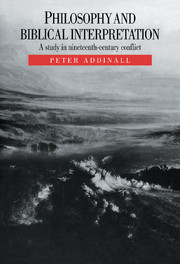Book contents
- Frontmatter
- Contents
- Preface
- Introduction
- 1 The general picture
- 2 David Hume
- 3 William Paley
- 4 Biblical conservatism
- 5 Conservative natural theology: Paley's design argument
- 6 Conservative natural theology: Thomas Chalmers
- 7 Liberal natural theology
- 8 The later nineteenth century
- 9 Immanuel Kant
- 10 Critical philosophy and the Bible
- Conclusion
- Notes
- Bibliography
- Index
7 - Liberal natural theology
Published online by Cambridge University Press: 23 December 2009
- Frontmatter
- Contents
- Preface
- Introduction
- 1 The general picture
- 2 David Hume
- 3 William Paley
- 4 Biblical conservatism
- 5 Conservative natural theology: Paley's design argument
- 6 Conservative natural theology: Thomas Chalmers
- 7 Liberal natural theology
- 8 The later nineteenth century
- 9 Immanuel Kant
- 10 Critical philosophy and the Bible
- Conclusion
- Notes
- Bibliography
- Index
Summary
It is obvious, but perhaps all the more worth stating on that account, that much scientific research was carried out in the nineteenth century without any reference to actual or possible conflict with religion. Many technical issues had no apparent connection with religious belief, and in any case the truths revealed to careful observation and intelligent experiment remained truths regardless of human taste, feeling and judgment. Furthermore, such matters had their own fascination for certain minds, whereas theology and biblical study did not; and if the essence of religion was to walk humbly with one's God, such humility could only be deepened by an increased appreciation of the works of God in nature. Indeed, contemplating the wonders of creation might seem to be a far more elevating occupation that participating in endless, and at times acrimonious, theological and biblical debate; and the pursuit of scientific research had nothing to gain by attaching to itself the burden of ecclesiastical censure.
A glance at the early volumes of the Edinburgh Review reveals much free discussion of scientific matters: chemistry, mineralogy, geology and a new French Natural History in twenty-four volumes, involving reference to such men as Black, Irvine, De Luc, Werner and Lavoisier. The Edinburgh New Philosophical Journal was very largely devoted to technical scientific matters, this being actually a cause for complaint by the Very Revd Dean Ramsay in his Opening Address to the Royal Society of Edinburgh, December 1861. The Dean wanted, alongside such technical subjects, more time and space devoted to topics of a more general cultural interest; thus bearing indirect witness to the dominating influence exercised over many reflective minds by the novel revelations of practical empiricism.
- Type
- Chapter
- Information
- Philosophy and Biblical InterpretationA Study in Nineteenth-Century Conflict, pp. 138 - 171Publisher: Cambridge University PressPrint publication year: 1991

